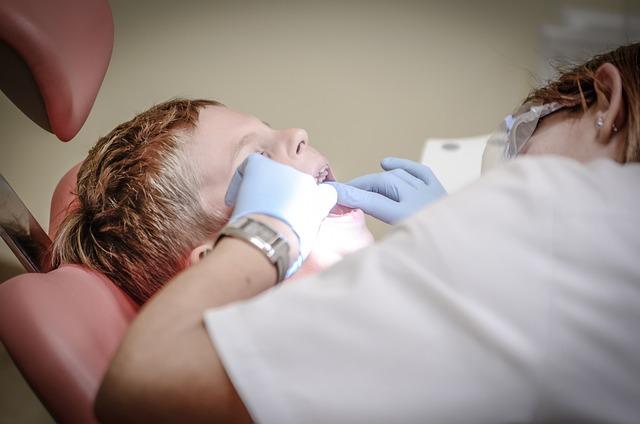What Does Salt Water Do After Wisdom Teeth Removal: Insights
Wisdom teeth removal: a rite of passage that many of us go through at some point in our lives. While the procedure itself may seem daunting, it is the aftercare that requires utmost attention. One common recommendation you might have come across is rinsing your mouth with salt water. But what exactly does salt water do after wisdom teeth removal? In this insightful article, we will delve into the benefits of this simple yet effective solution, providing you with a confident, knowledgeable, and neutral understanding of its role in the healing process. So, let’s dive in and discover the wonders of salt water for post-wisdom teeth removal care.
1. Understanding the Role of Salt Water for Optimal Healing Post Wisdom Teeth Removal
After undergoing wisdom teeth removal, proper care and maintenance of the surgical site is crucial for optimal healing. One effective method to promote healing is the use of salt water rinse. Salt water, also known as saline solution, has proven to be highly beneficial in preventing infection and reducing swelling.
Here are some key reasons why salt water is essential for a successful recovery:
- Antibacterial properties: Salt water acts as a natural disinfectant, killing bacteria that may cause infection in the surgical area.
- Reduced swelling: The gentle salt water rinse helps reduce swelling by drawing out excess fluid and promoting the healing process.
- Promotes blood circulation: Salt water helps increase blood circulation in the surgical site, aiding in the delivery of vital nutrients and oxygen for faster healing.
To prepare a salt water rinse, simply dissolve half a teaspoon of salt in a cup of warm water. Gently swish the solution in your mouth for about 30 seconds, making sure to reach all areas of the surgical site. Repeat this process at least 2-3 times a day, especially after meals and before bedtime, for optimal results.

2. The Healing Benefits of Salt Water Rinse: A Must-Have After Wisdom Teeth Extraction
After having your wisdom teeth extracted, it is crucial to take proper care of your oral health to ensure a smooth recovery. One highly recommended post-operative practice is the use of a salt water rinse. The healing benefits of this simple yet effective remedy are unparalleled, making it a must-have in your recovery routine.
Here are some key reasons why a salt water rinse is essential after wisdom teeth extraction:
- Promotes healing: Salt water is a natural disinfectant that helps prevent infection and reduces inflammation in the mouth. Rinsing with salt water promotes faster healing of the surgical site, minimizing discomfort and swelling.
- Reduces bacteria: Salt water has antibacterial properties that can help eliminate harmful bacteria in the mouth. This aids in preventing post-operative complications, such as infections or dry socket.
- Relieves pain: The gentle swishing of salt water can provide temporary relief from post-extraction pain and discomfort. It helps soothe the gums, reducing irritation and promoting a more comfortable healing process.
- Eases food debris removal: Salt water rinse can effectively cleanse the mouth, removing any food particles or debris that may have accumulated in the surgical area. This helps maintain oral hygiene and prevents the formation of plaque or bad breath.
Remember, a salt water rinse is not a substitute for proper oral hygiene practices, but it can significantly aid in your recovery after wisdom teeth extraction. Consult your dentist or oral surgeon for specific instructions on how to perform a salt water rinse correctly and incorporate it into your post-operative care routine.

3. Harnessing the Power of Salt Water: How it Aids in the Recovery Process Following Wisdom Teeth Removal
After undergoing wisdom teeth removal, it is crucial to properly care for the surgical site to ensure a smooth and speedy recovery. One highly effective method for aiding in this recovery process is harnessing the power of salt water. Salt water, also known as saline solution, possesses several properties that promote healing and prevent infection.
Here are some key ways in which salt water can aid in the recovery process:
- Reduces swelling and inflammation: Salt water helps to draw excess fluid away from the surgical site, reducing swelling and inflammation. This can alleviate discomfort and promote faster healing.
- Keeps the surgical area clean: Salt water acts as a natural disinfectant, killing bacteria and preventing infection. Regular rinsing with salt water can help keep the surgical area clean and free from harmful microorganisms.
- Promotes blood circulation: The warm salt water solution increases blood flow to the surgical site, which aids in the delivery of essential nutrients and oxygen. This enhanced circulation accelerates the healing process.
Using salt water as a mouth rinse is a simple yet effective way to harness its healing properties. To prepare a salt water rinse, dissolve half a teaspoon of salt in eight ounces of warm water. Gently swish the solution around your mouth for about 30 seconds and then spit it out. Repeat this process a few times a day, particularly after meals, to optimize the benefits.
4. Why Salt Water is Essential for Promoting Healing and Preventing Infection After Wisdom Teeth Extraction
Salt water is a powerful natural remedy that plays a crucial role in promoting healing and preventing infection after wisdom teeth extraction. Here’s why incorporating salt water into your post-extraction care routine is essential:
1. Reduces swelling and pain: Salt water acts as a natural disinfectant and anti-inflammatory agent. Gently rinsing your mouth with a salt water solution helps to soothe the surgical site, reduce swelling, and alleviate discomfort.
2. Prevents infection: Salt water possesses antimicrobial properties that can effectively kill bacteria and prevent infection. By rinsing with salt water, you create an environment that is less favorable for bacteria to thrive, reducing the risk of post-operative infections.
3. Aids in the removal of debris: After wisdom teeth extraction, there may be small food particles or other debris left around the surgical site. Salt water rinse can help dislodge and remove these particles, promoting a clean and healthy healing environment.
To prepare a salt water solution, simply dissolve half a teaspoon of salt in a cup of warm water. Gently swish the solution in your mouth for 30 seconds, making sure to reach all areas around the extraction site. Repeat this rinse 2-3 times a day, especially after meals, for optimal results.
Remember, while salt water is beneficial for healing, it is not a substitute for proper dental care. Follow your dentist’s instructions carefully, maintain good oral hygiene, and attend all follow-up appointments to ensure a successful recovery after wisdom teeth extraction.
5. The Science Behind Salt Water Rinse: Unveiling its Remarkable Effects on Post-Surgical Wound Healing
Salt water rinse, also known as saline solution, has been used for centuries as a natural remedy for various ailments. However, its remarkable effects on post-surgical wound healing have only recently been discovered through scientific research.
One of the key benefits of salt water rinse is its ability to create an optimal environment for wound healing. The saline solution helps to cleanse the wound, removing any debris or bacteria that may hinder the healing process. This promotes faster and more efficient healing, reducing the risk of infection and other complications.
Additionally, salt water rinse has been found to have anti-inflammatory properties. It can help to reduce swelling and redness around the wound, providing relief and speeding up the healing process. This is particularly beneficial for post-surgical wounds, where inflammation can be a common occurrence.
Furthermore, salt water rinse promotes the growth of new skin cells. The solution helps to stimulate the body’s natural healing mechanisms, encouraging the formation of new tissue and the closure of the wound. As a result, scars may be minimized and the overall healing time may be shortened.
In conclusion, the science behind salt water rinse unveils its remarkable effects on post-surgical wound healing. Its ability to cleanse the wound, reduce inflammation, and promote the growth of new skin cells make it a valuable tool in the recovery process. Incorporating salt water rinse into post-surgical care can greatly improve healing outcomes and provide patients with a more comfortable and efficient recovery experience.
6. Expert Insights: How Salt Water Rinse Supports Swift Recovery and Soothes Discomfort After Wisdom Teeth Removal
Salt water rinse is a simple yet effective technique that can significantly aid in the recovery process and alleviate discomfort following wisdom teeth removal. This natural remedy provides numerous benefits due to its antiseptic and soothing properties. Here are some expert insights on how salt water rinse can support a swift recovery and bring relief to the discomfort experienced post-surgery:
1. Reduces inflammation: Salt water rinse acts as a natural anti-inflammatory agent, helping to reduce swelling and inflammation in the gums. This is particularly beneficial after wisdom teeth removal, as the extraction process can cause some degree of tissue inflammation. By reducing inflammation, salt water rinse promotes faster healing and minimizes discomfort.
2. Prevents infection: Salt water has antimicrobial properties that can help prevent infection and promote oral hygiene. Gently swishing a salt water solution in the mouth can help kill bacteria and keep the surgical site clean. This is crucial in the initial days after wisdom teeth removal when the extraction site is most susceptible to bacterial growth and infection.
3. Soothes discomfort: The warm salt water solution can provide much-needed relief from pain and discomfort after wisdom teeth removal. The gentle swishing motion helps to stimulate blood flow, promoting healing and reducing sensitivity. Additionally, the salt water rinse can help soothe any minor irritation or soreness in the gums, providing a comforting sensation.
To prepare a salt water rinse, dissolve half a teaspoon of salt in eight ounces of warm water. Use the solution to rinse your mouth gently for about 30 seconds, ensuring that it reaches the extraction site. Repeat this several times a day, especially after meals, to maintain oral hygiene and support a swift recovery. Remember to consult your dentist or oral surgeon for personalized instructions and recommendations specific to your case.
7. Nurturing Your Oral Health: Exploring the Wonders of Salt Water Rinse Following Wisdom Teeth Extraction
After undergoing wisdom teeth extraction, it is crucial to take proper care of your oral health to promote healing and prevent complications. One effective method to nurture your oral health during the recovery process is by using a salt water rinse. This simple yet powerful solution provides numerous benefits that aid in the healing process and alleviate discomfort.
Here are some wonders of incorporating a salt water rinse into your post-extraction routine:
- Promotes healing: Salt water is a natural disinfectant that helps kill bacteria and reduce the risk of infection. Rinsing with a salt water solution helps keep the extraction site clean and aids in the healing process.
- Reduces swelling: Swelling is a common side effect after wisdom teeth extraction. Salt water rinse can help reduce inflammation and alleviate discomfort by drawing out excess fluid from the tissues.
- Relieves pain: The salt water rinse has a soothing effect on the oral tissues, providing relief from pain and discomfort associated with the extraction. It can also help reduce the chances of developing dry socket, a painful condition that can occur after wisdom teeth removal.
- Easy to prepare and use: Creating a salt water rinse is simple and can be done at home. Mix half a teaspoon of salt in eight ounces of warm water and stir until dissolved. Gently swish the solution in your mouth for 30 seconds, making sure to reach the extraction site, and then spit it out. Repeat this process two to three times a day or as recommended by your dentist.
By incorporating a salt water rinse into your oral care routine following wisdom teeth extraction, you can accelerate the healing process, reduce discomfort, and promote overall oral health. Consult with your dentist for specific instructions and advice tailored to your individual needs.
8. Unlocking the Secrets of Salt Water Rinse: An Essential Step in the Aftercare Regimen for Wisdom Teeth Surgery
After undergoing wisdom teeth surgery, it is crucial to follow a proper aftercare regimen to ensure a smooth and speedy recovery. One essential step in this process is the use of a salt water rinse. This simple yet effective technique can help prevent infection, reduce swelling, and promote healing.
To perform a salt water rinse:
- Mix 1 teaspoon of salt with 8 ounces of warm water.
- Stir until the salt is completely dissolved.
- Take a small sip of the solution and swish it around your mouth for about 30 seconds.
- Spit out the solution and repeat the process until you have used all of it.
It is recommended to perform this rinse at least 2-3 times a day, especially after meals and before bedtime. The salt water rinse helps in cleaning the surgical area, removing any food particles or debris that may have accumulated, and keeping the area free from bacteria. This can significantly reduce the risk of infection and promote optimal healing.
9. The Healing Power of Saline Solution: How Salt Water Promotes Faster Recovery Post Wisdom Teeth Extraction
Salt water, also known as saline solution, has been widely recognized for its remarkable healing properties when it comes to post wisdom teeth extraction recovery. Here are some key reasons why incorporating salt water into your aftercare routine can promote faster healing:
1. Reduces swelling and inflammation: A saline solution acts as a natural antiseptic, helping to minimize swelling and inflammation around the extraction site. By gently rinsing your mouth with warm salt water, you can effectively cleanse the area and prevent the buildup of harmful bacteria.
2. Promotes blood clot formation: Salt water aids in the formation of blood clots, which are crucial for the healing process after a wisdom tooth extraction. These clots protect the exposed socket, preventing infection and promoting the growth of new tissue.
3. Soothes discomfort and pain: The gentle saline rinse can provide relief from the discomfort and pain commonly experienced after wisdom teeth removal. It acts as a mild analgesic, soothing the affected area and reducing any lingering soreness.
To make a salt water solution, simply dissolve half a teaspoon of salt in a glass of warm water. Remember to avoid using hot water, as it may cause further discomfort. Use this solution to rinse your mouth gently for about 30 seconds, making sure to spit it out afterwards. Repeat this rinsing process several times a day, especially after meals, to ensure optimum healing and a faster recovery.
10. Maximizing the Benefits of Salt Water Rinse: A Comprehensive Guide to Enhance Healing After Wisdom Teeth Removal
After undergoing wisdom teeth removal, it is crucial to take proper care of your oral health to ensure a speedy and comfortable recovery. One effective method that can greatly enhance the healing process is the use of a salt water rinse. By following these steps, you can maximize the benefits of this simple yet powerful technique:
- Prepare the salt water solution: Dissolve half a teaspoon of salt in eight ounces of warm water. Ensure that the water is not too hot or cold, as extreme temperatures can cause discomfort.
- Swish the solution gently: Take a mouthful of the salt water solution and swish it around in your mouth for about 30 seconds. Be careful not to gargle or swallow the mixture.
- Spit out the solution: After swishing, spit out the salt water into the sink. Avoid rinsing your mouth with plain water immediately afterward, as it can dilute the beneficial effects of the salt water rinse.
Perform this salt water rinse at least four times a day, especially after meals and before bedtime. It helps to reduce swelling, prevent infection, and promote healing by keeping the surgical sites clean. Remember to continue this practice for the recommended duration advised by your dentist or oral surgeon, even if you start feeling better sooner. By maximizing the benefits of the salt water rinse, you can ensure a smoother recovery and minimize any potential complications.
Frequently Asked Questions
Q: What does salt water do after wisdom teeth removal?
A: Salt water, also known as saline solution, serves as a natural and effective way to promote healing and prevent infections following wisdom teeth removal.
Q: How does salt water help with the healing process?
A: Salt water helps to cleanse the surgical area, reducing the risk of infection. It also assists in reducing inflammation and swelling, providing a soothing and healing environment for the gums and tissues.
Q: What are the benefits of using salt water after wisdom teeth removal?
A: Using salt water as a mouth rinse helps to keep the surgical site clean and free from bacteria, minimizing the chance of developing post-operative complications. Additionally, it can alleviate discomfort and speed up the healing process.
Q: How often should salt water rinses be performed?
A: It is recommended to rinse with salt water 2-3 times a day, especially after meals, for the first few days following wisdom teeth removal. However, it is essential to follow the specific instructions provided by your dentist or oral surgeon.
Q: How should the salt water rinse be prepared?
A: To prepare a salt water rinse, dissolve half a teaspoon of salt in 8 ounces of warm water. Make sure the salt is completely dissolved before using the solution for rinsing.
Q: Is it safe to swallow the salt water during rinsing?
A: While it is generally safe to swallow small amounts of salt water, it is advisable to spit it out after rinsing. Swallowing excessive amounts may cause temporary discomfort or an upset stomach.
Q: Can salt water rinses replace regular brushing and flossing?
A: No, salt water rinses should be used as a supplement to regular oral hygiene practices. Brushing and flossing should continue as usual once your dentist or oral surgeon gives you the go-ahead.
Q: How long should salt water rinses be continued after wisdom teeth removal?
A: Salt water rinses should be continued for at least seven to ten days after the surgery, or as recommended by your dental professional. It is crucial to follow their instructions to ensure proper healing.
Q: Are there any alternative mouth rinses or products that can be used?
A: While salt water rinses are commonly recommended, there are also over-the-counter mouth rinses available that are specifically designed for post-operative care. Your dentist or oral surgeon can guide you on the most suitable options for your specific situation.
Q: Are there any side effects of using salt water after wisdom teeth removal?
A: Salt water rinses are generally safe and well-tolerated. However, in some cases, excessive use of salt water can cause dryness or irritation of the oral tissues. If you experience any persistent discomfort or unusual symptoms, it is advisable to consult your dental professional.
Closing Remarks
In conclusion, understanding what salt water does after wisdom teeth removal is crucial for a smooth recovery process. By following the recommended saline rinse routine, you can alleviate discomfort, reduce swelling, and promote faster healing. The gentle cleansing action of salt water helps to keep the surgical area clean, preventing infections and promoting oral hygiene. Additionally, the natural antiseptic properties of salt water can aid in reducing inflammation and preventing the growth of harmful bacteria. Remember to always consult your dentist or oral surgeon for specific instructions regarding salt water rinses and follow their guidance closely. By incorporating this simple yet effective technique into your post-operative care regimen, you can ensure a more comfortable and successful healing process.






